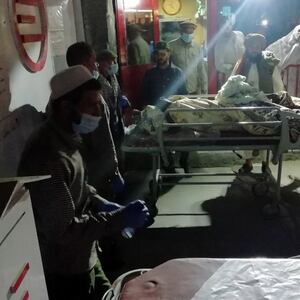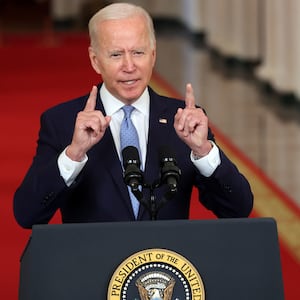No single factor determines the impact of violent extremists’ actions more than the reaction and response they trigger. And nothing illustrates this so well as the degree to which America’s leaders—political, military and in the media—played into the hands of al Qaeda and amplified the impact of its attacks to a degree they could not have imagined would be possible.
While the first part of Osama bin Laden’s plans were carried out by the 19 hijackers, the greatest damage done came as a result of the unwitting partnership between George W. Bush, Dick Cheney, Donald Rumsfeld, Fox News, the U.S. military, the defense establishment and thousands of others American influencers and decision-makers and the al Qaeda leader and his treacherous followers.
This is not blaming the victim. Al Qaeda is responsible for the horror of that day and the profound pain and suffering it caused. But in the wake of those attacks, the United States had a choice as to how we would respond. We could choose a response that was targeted, proportional and focused on depleting the capabilities of the attackers while strengthening our own defenses. Or we could choose a path that elevated the attackers, overstated their capabilities, depleted our resources, weakened our alliances, undermined our standing in the world and caused us to betray our most fundamental values thereby, in every respect, supporting the terrorists’ narratives and, even as they sustained losses, strengthening their cause. Over time, we chose the latter.
The reaction of President Bush and America’s leaders in the immediate wake of the attack was close to ideal. But very quickly, a dangerous cocktail of anger, sorrow, demagoguery and opportunism produced responses that in the end served the terrorists better than they served us. And by quickly, I mean simultaneously. Even as the administration was striking the right tone and taking steps any administration would take, like deploying troops to Afghanistan to seek out and destroy those behind the attack, it was also laying the groundwork for a series of disastrous decisions. Aides say that Donald Rumsfeld raised the issue of attacking Iraq—which had nothing to do with the 9/11 attacks—on Sept. 11. By the end of November, he prepared a memo contemplating how a war with Iraq might start. By January of 2002, during Bush’s State of the Union address, he was framing the battle as one between the U.S. and an “Axis of Evil” that included Iraq. Fifteen months later, we were at war.
At the same time, another dangerous concept was born. Five days after the Sept. 11 attack, Bush first used the phrase “war on terrorism.” In a speech to Congress a few days later, he referred to a “war on terror.” This idea elevated the threat posed by a handful of terrorists living on the run, often in caves, in Afghanistan and elsewhere into the intellectual equivalent of a conflict with peers and near-peers. The commander in chief told America we were in an existential battle with an enemy like those we had faced in World War II or the Cold War.
Of course, the threat was nothing like that. But by elevating it, a broader ambit for the conflict and more U.S. spending was justified. The resulting prosecution of that “war on terror” in Afghanistan, Iraq, Pakistan, Yemen, Liby, Syria, Somalia and elsewhere—at a cost of somewhere between $5.6 and $8 trillion—is estimated by the Watson Institute for International and Public Affairs to have killed nearly 1 million people while displacing nearly 40 million others.
It was recognizing the cost of over-reaction that led President Biden to finally bring an end to the conflict in Afghanistan, since “There’s nothing low-grade or low-risk or low-cost about any war.”
There are those still arguing that the war in Afghanistan was “worth the cost” because there was no second 9/11-type attack. But there had never been a 9/11 style attack before 9/11 either. And, they argue, there are many times more terrorists in the world today than there were in 2001. The number, according to US government estimates, may have “peaked” in 2014 (following the decade of highest spending in the “war”) but there are still tens of thousands of terrorists worldwide today including, according to the UN, 8,000 to 10,000 in Afghanistan alone as compared to no more than 200 in 2002. Twenty years of our “war on terror” clearly did not contain their numbers.
It must be asked whether the scope and nature of the U.S. “war”—to say nothing of the outright anti-Muslim racism of the last administration which was the grim embodiment of every accusation that had been leveled at the U.S. by terrorist enemies—did not contribute to the ability of terrorists to recruit. Hundreds of thousands of civilians dead in the war on terror, of course, contributed to that too. So did revelations of U.S. abuses and war crimes, from “rendition” to the use of torture at black sites and hell holes like Abu Ghraib to Guantanamo. Those abuses were a boon to terrorist recruitment at the same time that they damaged our standing in the world as we publicly violated principles of international law and the values we have been actively promoting for most of the last century.
As to the question of why the U.S. over-reacted so egregiously, and for so long, much of the blame belongs to military leaders who sought to protect their equities and avoid the blame for defeat and politicians who had personal agendas or served the defense establishment. But much blame also belongs to the public and the media.
Since the Reagan era, political leaders have been afraid to question or criticize the military lest they be condemned as unpatriotic. This sense was only heightened in the aftermath of Sept. 11, even as it was amplified by a new emotion-driven political reality that went past the Yellow Peril, the Red Scare, and centuries of racist fearmongering.
It is hard to remember now, but 9/11 came at the dawn of the information age, just five years after Fox News and MSNBC had been founded and three years after Google. There was no Facebook or podcasting, no YouTube or Twitter or Instagram. Forget phones— only about half of Americans had internet access (a Pew estimate says we hit 52 percent in 2000 while a World Bank estimate says we were at 49.1 percent in 2001.)
America was attacked just as a new information ecosystem fueled by emotion and innuendo, that promotes extreme views and resists rational argument, was coming into being. Twenty years of calamitous national security policies later, the public is if anything more primed now for an unthinking emotional response to an attack, and full of politicians with little compunction about taking advantage of such conditions.
Consequently, even if we reached a national consensus about the errors made in the wake of the 2001 attacks—which we have yet to do—the factors that could make responding to a future attack even more irrational are growing worse.
Be aware of this as you watch programs and read articles marking the 9/11 anniversary. Watch for the triggers for jingoism and irrationality that led to such a devastatingly bad response on the part of the U.S. Remember that our response made the world a more dangerous place while weakening America in the process. Because only through that kind of introspection and self-awareness can we actually diminish the likelihood of terrorists targeting America in the hope that we may again prove to be collaborators, lashing out blindly if hit.



